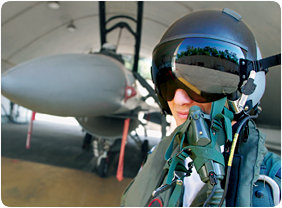The U.S. Air Force has started a first-of-its kind pilot program designed to train its active-duty physicians to provide battlefield acupuncture services, expanding health care services to personnel on the front lines in Iraq and Afghanistan.
In its Winter 2008 newsletter, the Air Force Medical Corps announced: "The Air Force Surgeon General is pleased to announce a pilot program to train a cadre of active-duty physicians in the emerging discipline of medical acupuncture. This is a unique course whose goal is to incorporate acupuncture into the practice of military medicine in the clinic and battlefield environments."
Armed service personnel can present special challenges for AOM treatment. Some of their most common complaints may include posttraumatic stress disorder (PTSD) and chronic low back pain from continuously carrying backpacks that weigh a minimum of 45 pounds. Fortunately, there is solid research backing the use of acupuncture to treat these conditions.1,2 However, in most cases, acupuncture is administered only to vets returning from their tour of duty, which could be months or even years after the initial trauma or injury. The Air Force is planning to fund 32 scholarships specifically for this training. The scholarships will cover the cost of study materials, supplies and any associated temporary duties. The upshot of all this is that Air Force physicians now have an expanded opportunity to bring the effectiveness of acupuncture treatment to a historically underserved population - and to do so more efficiently than ever before.
The Air Force announcement added, "The curriculum has been developed by the AF/SG Consultant for Complementary & Alternative Medicine, Col (Dr.) Richard Niemtzow, and by the Helms Medical Institute and has been specifically designed for use in a military environment. It is in fact, the first course of this kind to be offered in the Department of Defense. The techniques that will be taught are time-tested and can be used to treat neuromusculoskeletal pain as well as common functional and organic problems.
"All major disciplines of acupuncture that have practical clinical value will be taught by experienced civilian and military physicians. The curriculum includes fundamentals of acupuncture theory, channel and point location, approaches to diagnosis and therapy, myofascial palpation, needling techniques, electrical stimulation, and patient management. The live sessions are intensively supervised so that all participants will receive substantial individual attention."
 According to officials at the Air Force Surgeon General's office, "Over the past few years, acupuncture has been found to be quite effective in ameliorating some of the complex pain syndromes affecting many of our severely wounded warriors. The purpose of the pilot program is to a) more formally evaluate the effectiveness of acupuncture in reducing pain and facilitating an earlier assessment of TBI [traumatic brain injury] in seriously injured patients, and b) to assess the effectiveness (and practicality) of using acupuncture as a medical adjunct, in a deployed setting."
According to officials at the Air Force Surgeon General's office, "Over the past few years, acupuncture has been found to be quite effective in ameliorating some of the complex pain syndromes affecting many of our severely wounded warriors. The purpose of the pilot program is to a) more formally evaluate the effectiveness of acupuncture in reducing pain and facilitating an earlier assessment of TBI [traumatic brain injury] in seriously injured patients, and b) to assess the effectiveness (and practicality) of using acupuncture as a medical adjunct, in a deployed setting."
In addition to expanding the use of AOM, there is a potential for a real cost-savings in terms of care.
Joe C. Chang, MAOM, Dipl. OM, LAc, was the first acupuncturist in the United States selected to work with returning Iraq/Afghanistan vets at Ft. Bliss Restoration & Resilience Center-William Beaumont Army Medical Center. In an interview with Acupuncture Today, he explained that a study done by the RAND Corporation (a California-based think tank) has demonstrated to the military the value of alternative treatment approaches.
"What the military is realizing is that the current standard treatment protocols are not working. Standard mental health therapies included pharmacotherapy and cognitive-behavioral therapy. And if the soldier did not get better and had difficulty coping with the standard treatment, they were forced out of the military against their wishes. This means life-long veteran benefits that the Congressional Budget Office (CBO) estimates to be between $7 and $9 billion over the period 2008 through 2017 for Afghanistan and Iraq veterans. So, there is a big push for evidence-based research for PTSD and depression. The RAND Corporation estimates that the government could save as much as $1.7 billion, or $1,063 per returning veteran through evidence-based research."
Chang added that the Pentagon spent $5 million in 2008 on research in seeking new ways to treat troops suffering from combat stress or brain damage by researching alternative methods such as acupuncture, meditation or yoga.
With an estimated 144,000 troops (as of last August) stationed in Iraq and an additional estimated 20,000 troops in Afghanistan, this new Air Force program has the potential to reach out to vast new numbers of patients in need of AOM services.
References
- Hollifield M, Sinclair-Lian N, Warner T, Hammerschlag R. Acupuncture for posttraumatic stress disorder: A randomized controlled pilot trial. J Nerv Ment Dis 2007;195:504-13.
- Haake M, Muller HH, Schade-Brittinger C, et al. German Acupuncture Trials (GERAC) for chronic low back pain: randomized, multicenter, blinded, parallel-group trial with 3 groups. Arch Intern Med 2007;167(17):1892-8.
Acupuncture Today editorial staff members research, investigate and write articles for the publication on an ongoing basis. To contact the Editorial Department or submit an article of your own for consideration, email mailto:
.



